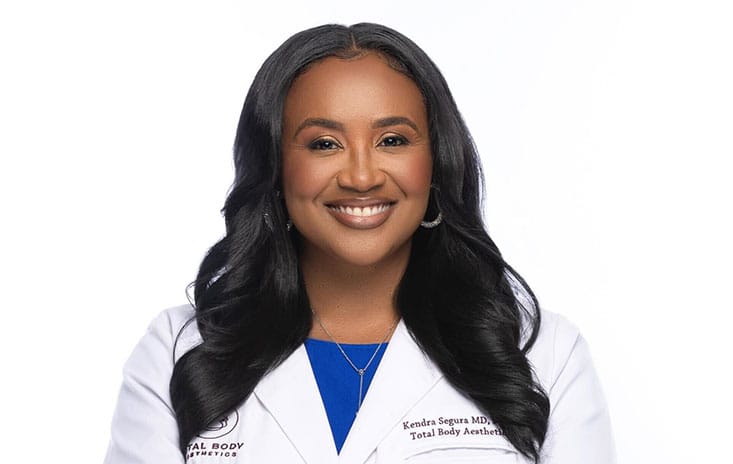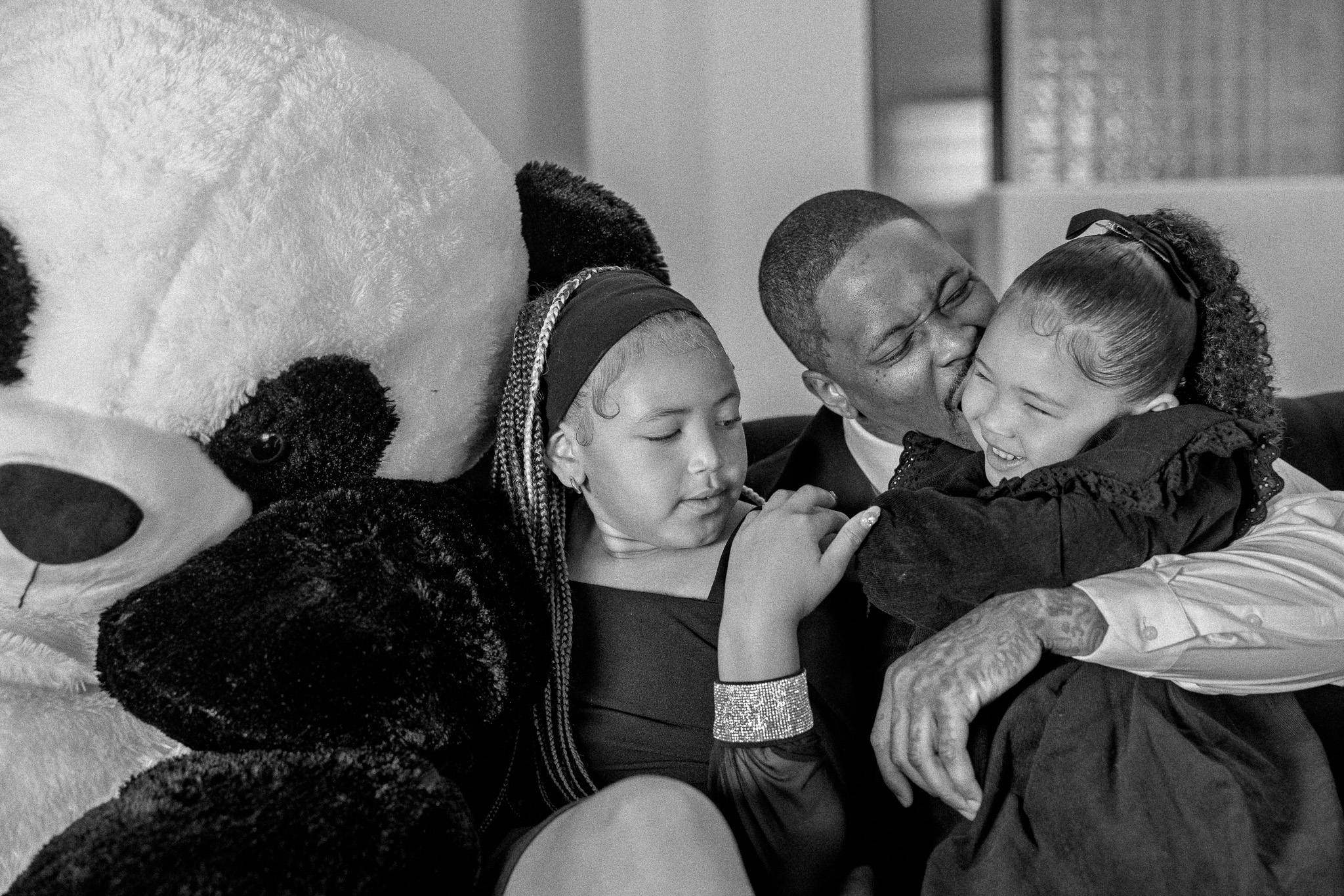
Featured_image_Dr-Kendra-Segura_IMG_4227
It’s no secret that motherhood is far from easy. Women already have enough on their plate trying to navigate their own lives, careers and health journeys. Becoming a mother adds another layer onto their life, and it becomes a gentle balancing act.
Women need to create safe spaces for themselves. Whether it’s through self-care rituals, time with friends or online forums, it’s imperative for women to take time away from the pressures of life to laugh and relax. “The Mama’s Den,” a Black Love original podcast centering authentic conversations from a mother’s perspective, offers the perfect unfiltered online community to do just that. Hosts Melanie Fiona, Felicia La Tour, Ashley Chea and Codie Elaine Oliver come together weekly to have open, honest discussions about everything from sexuality to health – with no topic off-limits.
This week, the ladies focused on a natural stage that all women will experience: menopause. Joined by a familiar face, OBGYN Dr. Kendra Segura breaks down everything women should know about this upcoming phase in their life. Similar to the episode where she answered questions about everything from fibroids to birth control, Segura once again brought her straight shooting expertise to the den.
Kicking off the conversation, Segura explained how to tell the difference between perimenopause and menopause. While both stages are marked by the amount of estrogen in the body lowering and specific symptoms, they are very distinct. “Perimenopause starts as early as 40,” she explains, adding that some women can begin to experience symptoms as early as 38 years old. “Menopause starts at the age where you stop getting periods for 12 months, so it has to be a year where you have no menstrual cycle, and that is your definition of when you hit menopause.”
Related Articles:
Celebrity Stylist Angela C. Stevens on Black Hair Care, Postpartum Hair Loss, and More
Ashley Blaine Featherson Opens Up About Her IVF Journey
“The Mama’s Den” Podcast Hits the Road With a Girls Trip at Yaamava Resort & Casino
Segura says that if you still have your period within a year, even if each cycle is months apart, then you are in perimenopause. The first phase of perimenopause could show a change where periods are not only closer together, but also heavier. It also is when many women begin to experience symptoms, like brain fog, hot flashes, frozen shoulder, dry skin, vaginal dryness, loss of libido and more. According to Segura, these symptoms can last seven to 10 years, with 13% of women experiencing them longer than 10 years.
“If you are having any signs … out of the ordinary, go follow up with your doctor,” Segura says. “Don’t just sit there and live with this because the average age for menopause is 51.”
Women know their bodies best and can identify when something has changed in their normal routine. It’s important that women listen to their bodies and stay up-to-date with their annual checkups. Segura explained that the only way to medically verify if a woman is going through perimenopause or menopause is through a hormone panel. The results of the test highlight hormone imbalances, so Segura advises women feeling like they’re undergoing menopause to ask their OBGYN to take it.
 Knowledge is power, and being aware of the facts, along with having an open communication with your OBGYN, is essential for navigating these phases. There also are many resources available to help women prepare for perimenopause and menopause, including books, like Dr. Jessica Shepherd’s “Generation M,” online forums, like the Black Girl’s Guide to Surviving Menopause, and groundbreaking documentaries, like “The M Factor.” These different materials equip women with the information they need to handle their body’s changes.
Knowledge is power, and being aware of the facts, along with having an open communication with your OBGYN, is essential for navigating these phases. There also are many resources available to help women prepare for perimenopause and menopause, including books, like Dr. Jessica Shepherd’s “Generation M,” online forums, like the Black Girl’s Guide to Surviving Menopause, and groundbreaking documentaries, like “The M Factor.” These different materials equip women with the information they need to handle their body’s changes.
After entering menopause, Segura asserts that any bleeding is a serious concern. In most instances, postmenopausal bleeding is due to benign conditions; however, for 10% of women, it can be a sign of uterine cancer. Depending on the individual’s risk factors, family history, age and weight, their doctor may opt to administer an endometrial biopsy. This 15-minute procedure involves using a small tube through the cervix into the uterus to collect a sample of the endometrial tissue for further testing.
The body undergoes all of these changes because it is losing estrogen, which Segura says is the only hormone that doesn’t come back after it’s gone. It’s responsible for maintaining bone health, fighting against cardiovascular diseases, getting women through the multiple stages of puberty and more. “It basically helps from head to toe,” she says.
The key to minimizing the symptoms of menopause lies in specific behavior and lifestyle modifications. Segura asserts that women often overlook the role of their eating and wellness rituals. With the loss of estrogen during menopause, it’s important to focus on eating healthy foods and maintaining a good workout routine to ease the symptoms of the phase. For more information, check out the episode now on all streaming platforms and Black Love’s YouTube channel.
Related Articles
John Legend shows the beauty of Black fatherhood in this Father Noir feature—love, presence, and parenting four kids with Chrissy Teigen.
Rapper YG is an example of Black fatherhood, raising daughters Harmony and Vibe and breaking generational cycles, as shown in this powerful Father Noir feature.
Qasim Basir’s To Live and Die and Live is not a film that offers easy answers.
Featured Articles
The vision for our engagement shoot was to celebrate ourselves as a Young Power Couple with an upcoming wedding, celebrating our five year anniversary - glammed up and taking over New York.
When Elitia and Cullen Mattox found each other, they decided that they wanted their new relationship together, their union, to be healthier and different.
Let’s take a trip down memory lane and revisit 10 times Michelle Obama gave us a masterclass in love.
Meagan Good and DeVon Franklin’s new relationships are a testament to healing, growth, and the belief that love can find you again when you least expect it.
When it comes to finding the perfect hairstyle for your wedding, there are a lot of options to choose from. The main goal is to pick the hairstyle that is just right for you.
Yes, I wanted my mom to still love me, but I needed her to love me. I wanted to know that by opening up about this part of my life she could actually love me more fully.











